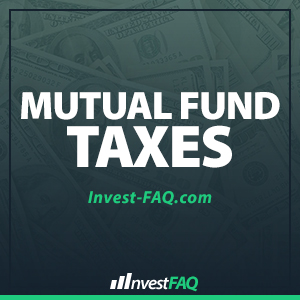 This article gives a brief summary of the issues surrounding distributions made by mutual funds, the tax liability of shareholders who receive these distributions, and the consequences of buying or selling shares of a mutual fund shortly before or after such a distribution.
This article gives a brief summary of the issues surrounding distributions made by mutual funds, the tax liability of shareholders who receive these distributions, and the consequences of buying or selling shares of a mutual fund shortly before or after such a distribution.
Investment management companies (i.e., mutual funds) periodically distribute money to their shareholders that they made by trading in the shares they hold. These are called dividends or distributions, and the shareholder must pay taxes on these payments. Why do they distribute the gains instead of reinvesting them? Well, a mutual fund, under The Investment Company Act of 1940, is allowed to make the decision to distribute substantially all earnings to shareholders at least annually and thereby avoid paying taxes on those earnings. And, of course, they do. In general, equity funds distribute dividends quarterly, and distribute capital gains annually or semi-annually. In general, bond funds distribute dividends monthly, and distribute capital gains annually or semi-annually.
What are the Tax Implications of a Mutual Fund Distribution?
When a distribution is made, the net asset value (NAV) goes down by the same amount. Suppose the NAV is $8 when you bought and has grown to $10 by some date, we’ll pick Dec. 21. On paper you have a profit of $2. Then, a $1 distribution is made on Dec. 21. As a result of this distribution, the NAV goes down to $9 on Dec. 22 (ignoring any other market activity that might happen). Since you received a $1 payment and your shares are still worth $9, you still have the $10. However, you also have a tax liability for that $1 payment.
Mutual funds commonly make distributions late in the year. Because of this, many advise mutual fund investors to be wary of buying into a mutual fund very late in the year (i.e., shortly before a distribution). Essentially what happens to a person who buys shortly before a distribution is that a portion of the investment is immediately returned to the investor along with a tax bill. In the short term it essentially means a loss for the investor. If the investor had bought in January (for example), and had seen the NAV rise nicely over the year, then receiving the distribution and tax bill would not be so bad. But when a person essentially increases their tax bill with a fund purchase, it is like seeing the value of the fund drop by the amount owed to the tax man. This is the main reason for checking with a mutual fund for planned distributions when making an investment, especially late in the year.
But let’s look at the issue a different way. The decision of buying shortly before a distribution all comes down to whether or not you feel that the fund is going to go up more in value than the total taxable event will be to you. For instance let’s say that a fund is going to distribute 6% in income at the end of December. You will have to pay tax on that 6% gain, even though your account value won’t go up by 6% (that’s the law). Assuming that you are in a 33% tax bracket, a third of that gain (2% of your account value) will be paid in taxes. So it comes down to asking yourself the question of whether or not you feel that the fund will appreciate by 2% or more between now and the time that the income will be distributed. If the fund went up in value by 10% between the time of purchase and the distribution, then in the above example you would miss out on a 8% after-tax gain by not investing. If the fund didn’t go up in value by at least 2% then you would take a loss and would have been better off waiting. So how clear is your crystal ball?
For someone to make the claim that it is always patently better to wait until the end of the year to invest so as to avoid capital gains tax is ridiculous. Sometimes it is and sometimes it isn’t. Investing is a most empirical process and every new situation should be looked at objectively.
And it’s important not to lose sight of the big picture. For a mutual fund investor who saw the value of their investment appreciate nicely between the time of purchase and the distribution, a distribution just means more taxes this year but less tax when the shares are sold. Of course it is better to postpone paying taxes, but it’s not as though the profits would be tax-free if no distribution were made. For those who move their investments around every few months or years, the whole issue is irrelevant. In my view, people spend too much time trying to beat the tax man instead of trying to make more money. This is made worse by ratings that measure ‘tax efficiency’ on the basis of current tax liability (distributions) while ignoring future tax liability (unrealized capital gains that may not be paid out each year but they are still taxed when you sell).
So what are the tax implications based on the timing of any sale? Actually, for most people there are none. If you sell your shares on Dec. 21, you have $2 in taxable capital gains ($1 from the distribution and $1 from the growth from 8 to 9). If you sell on Dec. 22, you have $1 in taxable capital gains and $1 in taxable distributions. This can make a small difference in some tax brackets, but no difference at all in others.
Article Credits:
Contributed-By: Chris Lott, S. Jaguiar, Art Kamlet, R. Kalia
